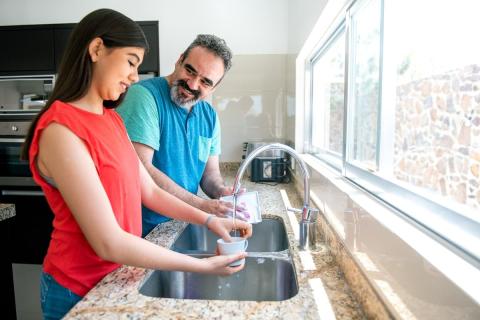You may not feel comfortable about it, but it’s a good idea to chat about these issues fairly regularly with your teen as part of your everyday conversations. For example, if a story about smoking or drugs comes up in the news or in a programme you watch, you could ask them what they think. The more open you are about these topics, the more likely your teen will be to come to you if they have any issues, for example, if they’ve started vaping and want to give up, or if they’re worried about being pressured into taking drugs.
Our page on talking and listening to your teen has more tips on encouraging your teen to open up to you, while our page on vaping, smoking, alcohol and drugs has more information about why teens experiment with these substances, how to spot the signs and where you can get support.
Talking to young people about vaping, smoking, alcohol and drugs
If you’ve spotted some of the signs that your teen may be experimenting with vaping, smoking, alcohol or drugs or you’re concerned about their behaviour, here are some tips for having a productive conversation about it.
Tip #1: Stay calm
If you suspect or find out that your teen has been vaping, smoking, drinking or taking drugs you may well feel upset or angry. But try to stay calm when you talk to them about it, as shouting and accusing them never gets us anywhere. If you need to let off steam, try talking to a trusted friend or family member instead.
Tip #2: Don't jump to conclusions
Many of the signs of vaping or tobacco, alcohol or drug use are also text book signs that your child is growing up and their hormones are running rampant! So don’t put two and two together and make five. And even if you’re sure, accusing or blaming them won’t help.
Tip #3: Pick your moment
Pick a good moment to talk to your teen, when you’ve time to have a proper discussion. If your teen comes home drunk or you’ve just found vapes, cigarettes or drug paraphernalia in their room, wait until they’re sober or you’ve calmed down before talking about it.
Tip #4: Know your facts
There are lots of reasons why your teen will be better off not vaping, smoking, drinking when they’re underage or taking drugs. So it’s a good idea to read up on the facts so you can talk to them in a balanced, informed way. There’s no need to bombard them with info, just make sure you know what you’re talking about.
Here are some sources that can help:
- ASH Scotland has helpful advice on talking to your teen about smoking and vaping.
- You could also try looking at these articles from Young Scot on smoking and mental health and the truth about vaping together, and ASH Scotland’s BeFree website for young people.
- Drinkaware has lots of information and advice on alcohol, including advice on talking to teens about alcohol.
- Talk to Frank has straightforward information on drugs, alcohol, tobacco and vaping, and you could also take a look at Know the Score.
Tip #5: Plan what you're going to say
It may help you keep calm if you work out in advance what you’ll say. Sticking to your script could stop the conversation turning into an argument.
Tip #6: Try to stay positive
Try not to blame your child or to talk about worst case scenarios. Instead, focus on how you can support them.
Tip #7: Help your teen make informed choices

Because their brains are still developing, teenagers don’t always think things through, and may not have considered the consequences of what they’re doing. You know your child best, so have a think about which things are likely to strike a chord with them. For example:
- If sport is important to them, you could talk about how smoking, drinking and drugs can damage their body and affect their performance.
- You could talk about how expensive these habits are, and what other things they could be spending their money on, like going to the cinema, seeing live music or buying new clothes. You could point out that because nicotine, drugs and alcohol are addictive, they could end up spending far more on them than they realise.
- If they’re concerned about the health of the planet, you could talk about how smoking and vaping and illegal drugs are harming the environment.
Tip #8: Focus on their behaviour
It may help to talk about how your teen is behaving before discussing vaping, smoking, alcohol or drugs. For example, if they’ve been irritable, withdrawn or angry you could start by saying you’ve noticed this and then ask them if there’s anything they’d like to talk about.
Tip #9: Listen to what they have to say
Don’t let the conversation be one-sided. Encourage your teen to talk about why they feel the urge to smoke, vape, drink or take drugs. Understanding this could help you help them. For example:
- If they’ve started because they feel stressed, you could talk about other, more positive ways to relieve stress. This article from the Royal College of Psychiatrists has more information about stress and how to handle it.
- If they feel pressured by their friends, you could help them work out ways to stand up to them, or suggest ways they can meet new people. Our page on peer pressure has more advice. This article from YoungMinds has helpful suggestions for dealing with peer pressure and you’ll also find tips on the Talk to Frank website.
- If you’re concerned that they may be using these habits to deal with mental health issues like anxiety or depression, there’s lots of support out there to help them cope in a healthy way. Our page on getting help and support when you’re raising a teen has more advice.
Tip #10: It's okay to let them know you're worried
Although it’s best to keep calm when you’re talking to your teen, it’s okay to let them know that you’re worried. If you explain why you’re worried, this may help them understand how their behaviour affects the whole family, not just themselves.
Getting help and support
If you’re concerned about your teen’s behaviour, you don’t have to cope with the situation on your own. Our page on vaping, smoking, alcohol and drugs lists organisations offering help and support, starting with your GP.
 Activities & Play
Activities & Play Behaviour
Behaviour Childcare
Childcare Development & Growing Up
Development & Growing Up Family, Friends & Relationships
Family, Friends & Relationships Feeding Your Baby
Feeding Your Baby Food & Eating
Food & Eating Health & Safety
Health & Safety Mental Health & Wellbeing
Mental Health & Wellbeing Money & Work
Money & Work Online Behaviour & Safety
Online Behaviour & Safety Pregnancy & First Days
Pregnancy & First Days School & Education
School & Education Sleep
Sleep








 Family, Friends & Relationships
Family, Friends & Relationships
 Mental Health & Wellbeing
Mental Health & Wellbeing